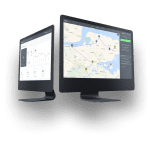E-commerce is revolutionising shopping, but thriving in this sector requires more than understanding its rapid evolution. As a forward-thinking entrepreneur, mastering specific segments and knowing when to accelerate is crucial.
Choosing suitable private courier options is vital for ecommerce companies to stay ahead in this dynamic world of fulfilment and shipping. This choice is critical to entering new markets and enlarging the customer base.
Many ecommerce merchants now offer same or next-day delivery services to meet customer demands. Yet, there’s often confusion: do these services fall under courier or postal categories?
Despite similar terms, these two differ significantly.
This article will enhance your knowledge of various courier services to elevate your business. We’ll clarify the differences between postal and courier services and guide you on transitioning from traditional to contemporary strategies.
What is a private courier service?
A private courier service is a private company offering shipping and delivery services to businesses. Companies employ these services to ensure their goods and parcels reach end customers efficiently. With advancements in shipping methods, courier companies now provide a range of options like customised delivery locations, same-day delivery, and local or regional shipping.
Recent studies indicate that about 41% of customers are open to paying extra for same-day delivery. Furthermore, 24% of shoppers are willing to pay a premium to have their packages delivered on the same day.
Types of courier services
Courier services come in various types, each tailored to specific shipping needs:
Time-Sensitive Shipping
This service guarantees delivery within a set timeframe, typically two to three business days. It often includes a specific delivery window, like 09:00 to 19:00. Within this category, there are:
- Same-Day Delivery: Ideal for urgent orders, this service ensures delivery on the same day of the order. However, it’s usually limited to certain areas.
- Next-Day Delivery: Items are delivered the day after the order is placed. This service is crucial for business growth, offering real-time tracking.
Local Shipping
This covers expedited delivery options, including same-day or within 24 hours, commonly used for urgent documents.
Intelligent Routing
This method optimises the delivery route by considering custom factors, geography, and weather conditions, ensuring the most efficient path for your shipment. This is known as route optimisation.
Onboard Courier
This service provides specialised handling for items needing extra care or confidentiality to ensure smooth and secure transit.
International Shipping
This service manages overseas deliveries, including all aspects of cross-border shipments, like taxes and customs duties.
Delivery driver or courier – what are the differences?
Delivery drivers and courier services share similarities, such as transporting products, important documents, or packages. Yet, distinct differences exist, particularly in handling speciality items and adhering to time constraints. The overall structure of these roles also varies.
Delivery drivers typically follow a multi-step route with several stops to deliver items. In contrast, couriers might traverse different routes but enjoy more workday flexibility.
Couriers are adept at integrating last-minute orders into their schedule and often handle smaller items like documents. Conversely, larger or bulkier items usually require postal shipping services, requiring more preparation time.
When to use a private courier service?
When selecting a courier service, consider these key factors:
- Expanding Locations: Opt for a courier agency when your business is ready to grow geographically. The chosen third-party logistics should cover a broad range of locations. Be cautious, as some firms may only serve limited areas, which might not align with your expansion plans. Conduct thorough research to identify a service that best fits your business needs.
- Speed of Delivery: Crucial for businesses dealing in fast-moving consumer goods (FMCG), the speed at which products are delivered is paramount. Choose third-party logistics capable of rapid delivery to ensure your products reach customers swiftly.
- Cost Management: As your business scales, finding ways to manage and reduce costs becomes essential, especially with increasing order volumes. Partnering with courier services can be a strategic move. These providers often charge based on product size and weight, and third-party logistics services can assist in efficiently managing delivery and shipment processes at various levels.
What are ecommerce postal service deliveries?
Postal services are typically run by government agencies and manage the delivery of goods and documents to end users. They are essential shipping entities that handle a range of items. However, these government-linked services have historically experienced shipment delays, leading to their predominant use for non-urgent deliveries.
They facilitate shipments within and beyond national borders, often incurring additional fees. The role of postal services is crucial in enhancing national connectivity and streamlining business product delivery.
As government-operated entities, postal services organise and distribute letters and packages, mainly domestically and occasionally internationally.
Private courier services vs postal deliveries
Cost comparison
The primary difference in cost between postal and courier services is significant. Postal services are generally more affordable, attributed to their longer delivery times and limited tracking capabilities. On the other hand, courier services command higher fees due to their rapid delivery, superior service quality, and reliability. They also tend to charge extra for customisable delivery options.
While courier services may seem like a significant financial commitment, their offerings, including tailored delivery speeds, often justify the cost.
Tracking capabilities
Both services offer courier tracking, but there’s a notable difference in international shipping. Postal services may need more real-time tracking, which can lead to uncertainty about the package’s whereabouts.
Conversely, courier services excel in this area, offering transparent and consistent tracking for national and international shipments, ensuring customers are well-informed about their package’s journey.
Which is better for ecommerce? Private couriers or postal services?
A Deloitte report suggests that over 70% of customers prioritise convenience and free shipping as their primary motivators for online purchases.
When deciding between postal and courier services, consider critical factors like speed, availability, traceability, cost, eco-friendliness, and reach. In these aspects, courier services often have the upper hand.
Given these criteria, it’s evident that courier services generally surpass postal services in efficiency and effectiveness. Additionally, integrating technology in courier services provides businesses with a competitive advantage.
Ecommerce courier FAQs
What are the advantages of courier service over public postal service?
E-commerce courier services offer several key benefits, including rapid delivery, real-time international tracking, high-quality service, and meeting the demands of a modern, tech-savvy generation. These features are instrumental in their success within the competitive e-commerce landscape.
Which is faster, postal or courier?
Courier services offer quicker delivery options than postal services, including same-day and next-day delivery services.
What is a courier address?
The courier address is where the item will be delivered, typically the end user’s address. However, companies may also dispatch items to suppliers, manufacturers, and distributors.
What is a postal address?
A physical address represents a specific geographical location or street address. In contrast, a postal address is the destination for mail delivery. Depending on your preferred mail reception location, these addresses can be the same or different.
What is the difference between ‘standard post’ and ‘courier post?’
Courier post encompasses activities focused on collecting and delivering parcels swiftly. On the other hand, standard post, often referred to as regular mail, is typically used for sending letters and items where delivery time could be more critical.
- What is a private courier service?
- Types of courier services
- Delivery driver or courier - what are the differences?
- When to use a private courier service?
- What are ecommerce postal service deliveries?
- Private courier services vs postal deliveries
- Which is better for ecommerce? Private couriers or postal services?





